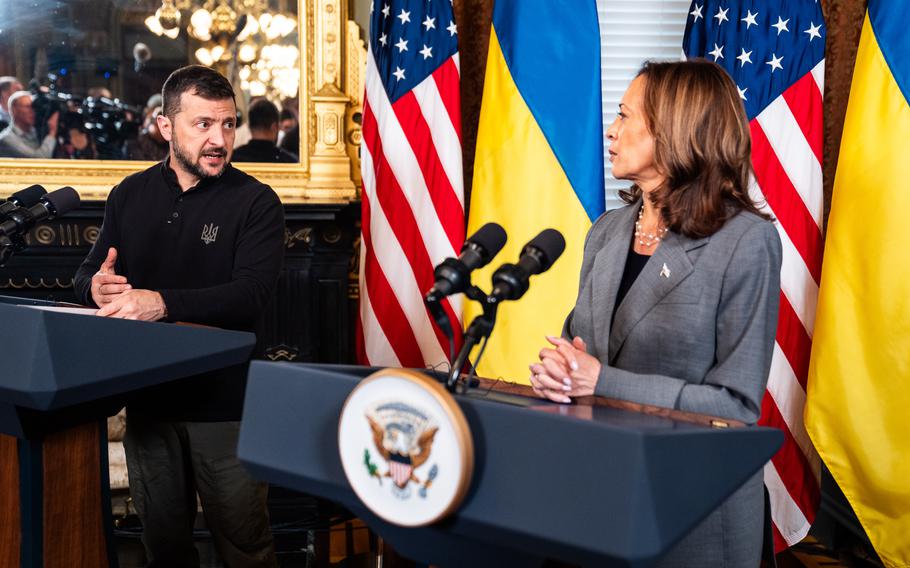Europe
Ukraine left in security limbo with Zelensky US trip results unclear
The Washington Post October 5, 2024

Democratic presidential nominee Vice President Kamala Harris meets with Ukrainian President Volodymyr Zelensky in Washington on Sept. 26, 2024. (Demetrius Freeman/The Washington Post)
KYIV — More than a week after Ukrainian President Volodymyr Zelensky presented his “victory plan” for how to end the war with Russia to top U.S. officials, details of the strategy and how it was received remain hazy, and Kyiv is scrambling for additional international support just a month before the U.S. election.
Zelensky’s administration has so far kept the points of the victory plan, which was shared with President Joe Biden and other top officials, a secret, but it likely hinges on either accelerated NATO membership or binding security guarantees from the Ukraine’s Western partners.
The trip, which was viewed as a key opportunity by Ukrainian officials for Zelensky to sell the United States on how to support Ukraine going forward, failed to resonate in Washington. Biden held his stance on prohibiting U.S.-provided longer-range missiles to strike inside Russia and Zelensky found himself caught in a political crossfire as influential Republicans largely criticized or snubbed him. A meeting with Republican presidential nominee Donald Trump — Zelensky’s first since the start of the war - came together hastily after Trump initially said he didn’t plan to meet.
Zelensky’s U.S. swing reinforced the sort of unsettling limbo Ukraine now finds itself in going forward — reliant on the United States as its main ally to arm it against Russia yet unsure how long that support will continue as attention on the war fades in its third year and with the new escalation in the Middle East.
“Nobody is planning to abandon Ukraine, but Ukraine is definitely not in the top three of main issues for the U.S. right now,” said Mykola Davydiuk, a Kyiv-based political expert. “And maybe it’s because of a lack of preparation and understanding of what the U.S. is dealing with right now, but it does look like he was a couple of steps lower than during his previous visits.”
Zelensky will have another chance to pitch the victory plan next week at a meeting of the Ukraine Defense Contact Group in Ramstein, Germany, which Biden will attend. After Zelensky failed to get the missile restrictions lifted, Kyiv could receive some other sort of aid during the Germany conference, said a Western diplomat, who spoke on the condition of anonymity to discuss a sensitive matter.
In particular, the diplomat said, NATO counties have been considering ways to give Ukraine more concrete steps for future membership to the alliance — though likely still short of the urgent action Kyiv has requested.
At issue for Ukrainian officials is that the looming U.S. presidential election — and a new administration regardless the outcome — puts future security assistance to Ukraine in doubt. Zelensky’s team tried to convince Biden to support the victory plan as a way to solidify Biden’s legacy before his term ends. But the White House is unlikely to take any action now that could be unpopular so as to not jeopardize Kamala Harris’s campaign, officials said.
Though Zelensky and his government have repeatedly said that ceding Ukrainian land to Russia, which occupies more than 20 percent of the country now, would be a nonstarter, ordinary Ukrainians are showing more acceptance for talks that would make temporary compromises on territorial integrity — as long as NATO membership or security guarantees from allies were part of the deal, said Anton Grushetskyi, the director of the Kyiv International Institute of Sociology, which has been polling people’s attitudes.
“There will not be a situation in which the absolute majority will recognize the occupation of their territory,” Grushetskyi said. “But Ukrainians are prepared for a format that would postpone the full return of certain territories for the future, only on the condition that there is some kind of security factor in place.”
Public sentiment has shifted as Ukraine has struggled on the battlefield over the past year and people far from the front have endured rolling blackouts from Moscow’s bombardment of the power grid. Russia has regained the offensive initiative on the front line while Ukraine is rushing to replenish its depleted ranks with a mobilization campaign.
Ukraine’s surprising cross-border incursion into Russia’s Kursk region over the summer was a morale boost domestically and a statement to Ukraine’s allies that it was still capable of battlefield gains. But that offensive has largely come to a standstill while Ukraine has continued to lose ground in its eastern regions, including the city of Vuhledar just earlier this week.
With the war looking more like a stalemate, the support from Ukraine’s Western partners has also been more tempered.
“In 2023, there were high hopes, but in 2024, there are a lot of disappointments and it’s unclear what will happen down the line — that’s a fact,” said Oleksiy Goncharenko, a member of parliament in the opposition European Solidarity party.
Goncharenko said Zelensky’s victory plan was unlikely to contain some sort of revolutionary element — a sentiment echoed by a Western official in Ukraine who said it contained “nothing surprising.” The Ukrainians are counting on a greater buy-in from their allies with more weapons, NATO membership and, if possible, more sanctions on Russia.
“If the West would give us the maximum amount of aid, Ukraine could achieve even today a victory in the full understanding of the word,” he said. “What we’re getting is constantly restricted.”
Ellen Francis in Brussels contributed to this report.